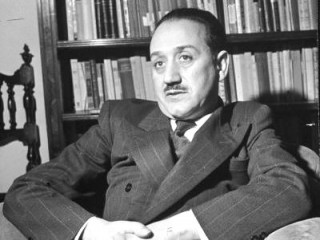
Ignazio Silone biography
Date of birth : 1900-05-01
Date of death : 1978-08-22
Birthplace : Pescina, Italy
Nationality : Italian
Category : Famous Figures
Last modified : 2011-06-28
Credited as : Writer and author, politician Socialist party , editor of Avanti!
Ignazio Silone was born Secondino Tranquilli on May 1, 1900, at Pescina dei Marsi in the Abruzzi. His father was a small landowner. In 1915 Silone lost both parents and five brothers as a result of an earthquake. He received part of his education at the local seminary and continued his studies in Reggio Calabria but interrupted them at the end of World War I, when he became interested in politics. The circumstances forced him, as he once said, to endure firsthand three essential experiences: poverty, religion, and communism. Thus he took part in the founding of the Italian Communist party (PCI) in 1921 as a representative of the Socialist Youth movement. Subsequently, he became a member of the directorate of the PCI, which he represented at several international conferences. He also was editor of various Communist papers.
After the Fascist takeover Silone went into hiding and worked against the regime. After disagreements over the issue of following central party directives, however, he broke with the Communist party, left the country, and settled in 1930 in Switzerland. There he began to write his first book. After his return to Italy in the fall of 1944, he was for a time a member of the Socialist party and editor of Avanti!, its daily. After the split in the party, however, he retired from active politics.
Silone was one of the few contemporary Italian novelists who were actively involved in the political issues of their time, an involvement which for Silone became the very theme of his fiction. The particular subject of almost all his novels is the poor, ignorant peasant world of the South and the millenary injustice meted out to it by whatever oppressive superstructure has been in power. It was Silone who introduced the cafoni of his native countryside into literature in works of an extreme stylistic simplicity which are meant to accuse and yet at times read like a eulogy of a world constant, simple, and uncontaminated.
Fontamara (1933), written in a Swiss sanatorium and subsequently translated into over 2 dozen languages, was Silone's first book. The novel does not present theoretical and polemic arguments, as might be expected. It is the simple story of village peasants being condemned to wretchedness and unemployment by a ubiquitous big landowner who thwarts their attempts to use the water of a brook to irrigate their plots. The following two novels, Pane e vino (1937; Bread and Wine) and Il seme sotto la neve (1940; The Seed Beneath the Snow), deal with the problematic relationship between party ideology and the exigencies of the cafoni's life.
Una manciata di more (1952) takes up again the failure of political parties to right the wrongs of poverty and injustice in the social structure of society. And again, the discrepancies are seen not in terms of specific political parties but as an oppression of the poor by the rich, with whom any political party will come to terms. Thus, changes on the political scene mean next to nothing if the socially oppressive structure is not changed. In Il segreto di Luca (1956; The Secret of Luca) outward sociopolitical aspects seem to be less obtrusive, but even here, where the right to a personal life clashes with the demands of the state, political overtones are determinant after all. La volpe e le camelie (1960; The Fox and the Camellias) is the first novel of Silone's that is not placed in the Italian South, but it, too, takes up political aspects and their moral and social consequences under Fascist rule. L'avventura d'un povero cristiano (1968), which was awarded the Campiello Prize, depicts the historical clash between popes Celestine V and Boniface VIII and the conflict of individual spirituality with institutionalized religion.
Silone wrote little in the last decades of his life. At a symposium with Arthur Koestler in 1968, Silone called himself "a socialist without a party, a Christian without a church." His last novel, Severina, was finished and largely written by his wife. It was his only work to feature a female protagonist. He died in Geneva, Switzerland, in 1978.
















